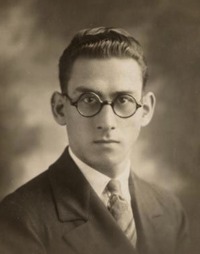Difference between revisions of "Israel Regardie"
Occultwiki (talk | contribs) |
Occultwiki (talk | contribs) |
||
| Line 5: | Line 5: | ||
==Biography== | ==Biography== | ||
Born to a working-class Orthodox Jewish family in the East End of London, Regardie and his family soon moved to Washington, D.C. in the United States. Regardie rejected Orthodox [[Judaism]] during his teenage years and took an interest in Theosophy, [[Hinduism]], Buddhism, and Jewish mysticism. | Born to a working-class Orthodox Jewish family in the East End of London, Regardie and his family soon moved to Washington, D.C. in the United States. Regardie rejected Orthodox [[Judaism]] during his teenage years and took an interest in [[Theosophy]], [[Hinduism]], Buddhism, and Jewish mysticism. | ||
It was through his interest in [[yoga]] that he encountered the writings of the occultist [[Aleister Crowley]]. Contacting Crowley, he was invited to serve as the occultist's secretary, necessitating a move to Paris, France in 1928. He followed Crowley to England before their association ended. Living in England, he wrote two books on the [[Kabbalah]], ''A Garden of Pomegranates'' and ''The Tree of Life''. In 1934 he then joined the Stella Matutina—a ceremonial magic order descended from the defunct [[Hermetic Order of the Golden Dawn]]—but grew dissatisfied with its leadership and left. He also studied psychology, being particularly influenced by ideas from Jungian psychology, and explored [[Christianity|Christian]] mysticism. | It was through his interest in [[yoga]] that he encountered the writings of the occultist [[Aleister Crowley]]. Contacting Crowley, he was invited to serve as the occultist's secretary, necessitating a move to Paris, France in 1928. He followed Crowley to England before their association ended. Living in England, he wrote two books on the [[Kabbalah]], ''A Garden of Pomegranates'' and ''The Tree of Life''. In 1934 he then joined the Stella Matutina—a ceremonial magic order descended from the defunct [[Hermetic Order of the Golden Dawn]]—but grew dissatisfied with its leadership and left. He also studied psychology, being particularly influenced by ideas from Jungian psychology, and explored [[Christianity|Christian]] mysticism. | ||
Latest revision as of 03:08, 11 November 2024
Francis Israel Regardie (/rɪˈɡɑːrdi/; né Regardie; November 17, 1907 – March 10, 1985) was an English occultist, ceremonial magician, and writer who spent much of his life in the United States.
He wrote fifteen books on the subject of the occult and was a frequent contributor to The Occult Review.
Biography
Born to a working-class Orthodox Jewish family in the East End of London, Regardie and his family soon moved to Washington, D.C. in the United States. Regardie rejected Orthodox Judaism during his teenage years and took an interest in Theosophy, Hinduism, Buddhism, and Jewish mysticism.
It was through his interest in yoga that he encountered the writings of the occultist Aleister Crowley. Contacting Crowley, he was invited to serve as the occultist's secretary, necessitating a move to Paris, France in 1928. He followed Crowley to England before their association ended. Living in England, he wrote two books on the Kabbalah, A Garden of Pomegranates and The Tree of Life. In 1934 he then joined the Stella Matutina—a ceremonial magic order descended from the defunct Hermetic Order of the Golden Dawn—but grew dissatisfied with its leadership and left. He also studied psychology, being particularly influenced by ideas from Jungian psychology, and explored Christian mysticism.
In 1937 he returned to the United States. Concerned that the Golden Dawn system of ceremonial magic would be lost, he published the Stella Matutina rituals in a series of books between 1938 and 1940. This entailed breaking his oath of secrecy and brought anger from many other occultists. During the Second World War he served in the U.S. Army. On returning to the U.S., he gained a doctorate in psychology before relocating to Los Angeles in 1947 and setting up practice as a chiropractor.
While in Los Angeles, he met Sybil Leek, a witch from England, and taught her the basics of Kabbalah.
In 1981 he retired and moved to Sedona, Arizona, where he died of a heart attack four years later.
Personal life
Over the course of his life, Regardie married and divorced three times; he had no children.
Regardie suffered from asthma, sometimes known as "the occultist's disease" within the occult community. Suster noted that, in old age at least, Regardie had "a most delightful sense of humour". He was a fan of boxing; it was one of the few things he would watch on television. He enjoyed cannabis and, in later life, used LSD around once a year.
